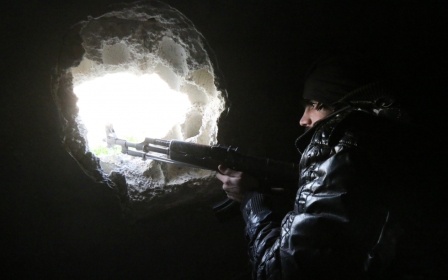Human Rights Watch: Hundreds of barrel bombs dropped in civilian areas in Syria

The Syrian government has carried out widespread indiscriminate aerial attacks on heavily populated civilian areas, killing thousands of civilians, according to a Human Rights Watch report.
The report published testimonies from survivors located in various provinces within the country, and said that hundreds of barrel bombs were dropped in residential areas as well as near medical complexes, schools and mosques.
Thousands of civilians were killed, including 1,892 children and 1,720 women since the passing of UN Security Council resolution 2139 on 22 February 2014. The resolution called on all Syrian factions involved in the civil war to allow access for humanitarian aid, in addition to ending the use of high explosive munitions such as barrel bombs and other weapons in civilian areas.
Syrian President Bashar al-Assad claimed in an interview earlier in February this year that his forces were not using barrel bombs despite evidence to the contrary.
Barrel bombs are made from oil drums filled with high explosives and shrapnel to enhance fragmentation, and then dropped from helicopters. Cheaply made and locally produced, they are more destructive than conventional bombs.
“For a year, the Security Council has done nothing to stop Bashar al-Assad’s murderous air bombing campaign on rebel-held areas, which has terrorised, killed and displaced civilians,” said Nadim Houry, deputy Middle East and North Africa director for Human Rights Watch. “Amid talk of a possible temporary cessation of strikes on Aleppo, the question is whether Russia and China will finally allow the UN Security Council to impose sanctions to stop barrel bombs.”
Using satellite imagery, the group said it identified more than 450 major damage sites in 10 towns and villages held by opposition groups in Deraa and more than 1,000 in Aleppo between 22 February 14 and 25 January 2015. Dozens of videos uploaded to Youtube were also examined, in addition to footage showing Syrian Mi-17 helicopters dropping both conventional and improvised bombs on Aleppo and Deraa.
HRW interviewed humanitarian worker “Samih” who witnessed four barrel bomb attacks in the town of Dael, located on the road between Deraa and Damascus. Two of the bombs landed on schools, the third struck the road leading to Tafas, and the fourth hit a school bus, resulting in the deaths and injuries of dozens of schoolchildren.
“Most of the dead were children who were in the service [the school bus] hit by the barrel,” he said. “There were 16 in the service…Bisan Khalil al-Kankari, 10, was killed…Three other kids from one family… [my niece] lost both her legs below the knee… [and my nephew] was injured in the face and lost both of his legs.”
Samih said that although the village was held by rebel fighters from the Free Syrian Army, none of them were based in the village when the barrel bombs fell.
Eleven people were killed in total, including seven children, and 28 more were injured in that particular attack.
“These impact sites have damage signatures strongly consistent with the detonation of large, air-dropped munitions, including improvised barrel and conventional bombs dropped by helicopters,” the report said. “Damages that possibly result from the use of rockets, missiles or fuel-air bombs are also likely in a number of instances.”
It also said independent reports filed by Syrian groups tracking civilian casualties showed that the government attacks led to the deaths of thousands of civilians in opposition-held territory over the last year.
“The Security Council should impose an arms embargo on Syria’s government and any groups implicated in widespread or systematic human rights abuses,” the New York-based group said. “Such an embargo would limit the Syrian government’s ability to conduct aerial attacks that violate international law, including by prohibiting providing Syria with new helicopters or providing outside support for servicing them.”
It said a travel ban and an asset freeze should also be imposed on individuals implicated in grave human rights abuses.
“One year on, the onus is on Assad’s protectors on the Security Council to stop the slaughter of Syrian civilians by their government,” Houry said. “Other countries, including Western and emerging powers, should increase the pressure on Russia and China to stop blocking international action to curb the Syrian government’s deadly crimes,” he added.
The Security Council will meet on 26 February for its next round of reporting on resolution 2139.
Stay informed with MEE's newsletters
Sign up to get the latest alerts, insights and analysis, starting with Turkey Unpacked
Middle East Eye delivers independent and unrivalled coverage and analysis of the Middle East, North Africa and beyond. To learn more about republishing this content and the associated fees, please fill out this form. More about MEE can be found here.





